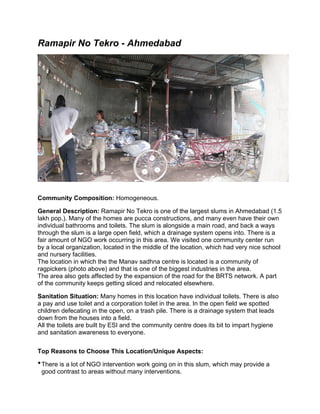Ramapir No Tekro_Ahmedabad
- 1. Ramapir No Tekro - Ahmedabad Community Composition: Homogeneous. General Description: Ramapir No Tekro is one of the largest slums in Ahmedabad (1.5 lakh pop.). Many of the homes are pucca constructions, and many even have their own individual bathrooms and toilets. The slum is alongside a main road, and back a ways through the slum is a large open field, which a drainage system opens into. There is a fair amount of NGO work occurring in this area. We visited one community center run by a local organization, located in the middle of the location, which had very nice school and nursery facilities. The location in which the the Manav sadhna centre is located is a community of ragpickers (photo above) and that is one of the biggest industries in the area. The area also gets affected by the expansion of the road for the BRTS network. A part of the community keeps getting sliced and relocated elsewhere. Sanitation Situation: Many homes in this location have individual toilets. There is also a pay and use toilet and a corporation toilet in the area. In the open field we spotted children defecating in the open, on a trash pile. There is a drainage system that leads down from the houses into a field. All the toilets are built by ESI and the community centre does its bit to impart hygiene and sanitation awareness to everyone. Top Reasons to Choose This Location/Unique Aspects: ‚óè There is a lot of NGO intervention work going on in this slum, which may provide a good contrast to areas without many interventions.
- 2. ● Even though homes have their own individual toilets , the community center worker lamented that most people would still defecate outside when the toilets are occupied. ● A lot of homes on the periphery of the open grounds have no toilets and the go to ‘khadda’s’ to defecate ● The community intervention doesnt run throught the entire area. There are parts of the community where the resident dwellers are still using community toilets or practising open defecation.


